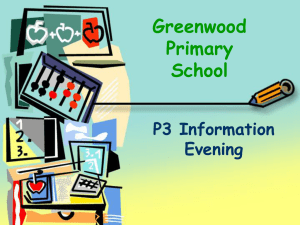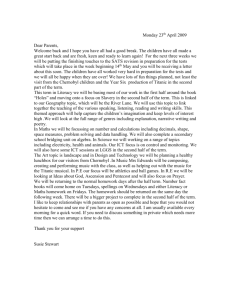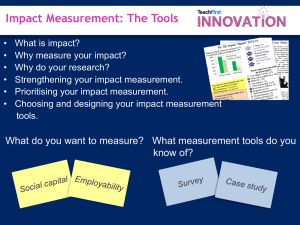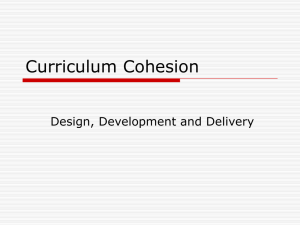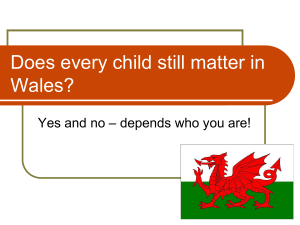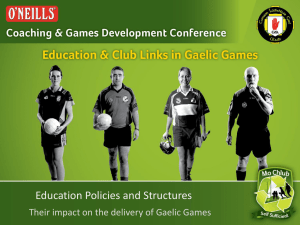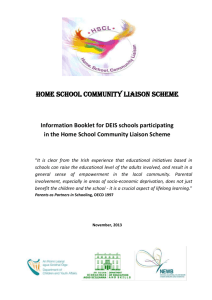stimulate programme
advertisement
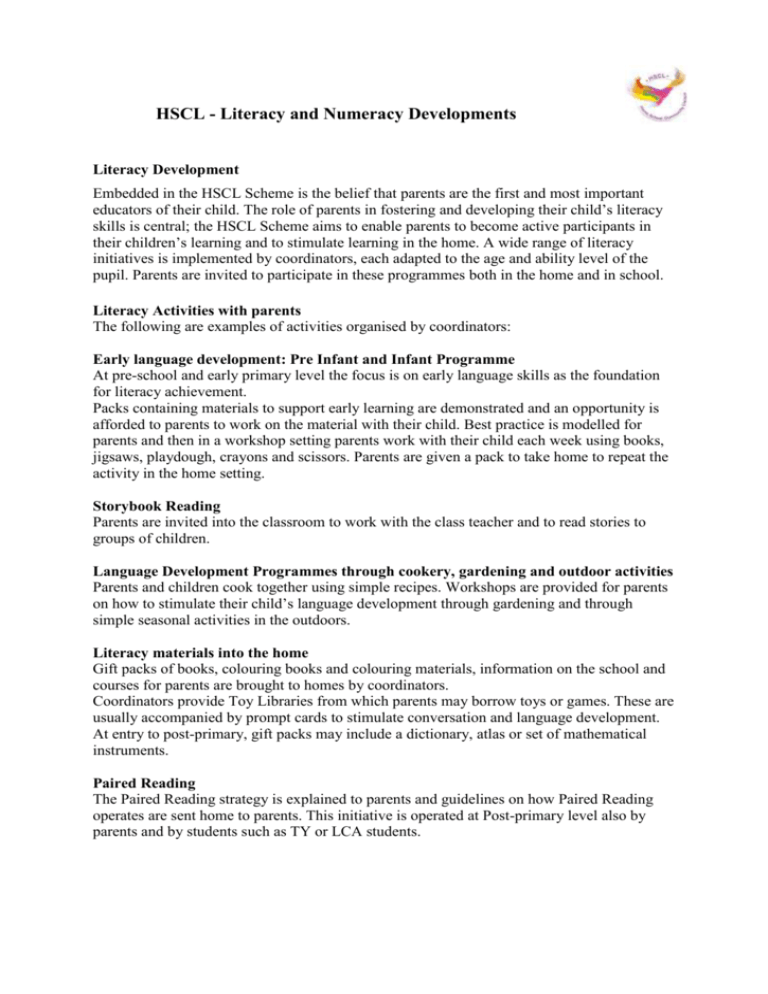
HSCL - Literacy and Numeracy Developments Literacy Development Embedded in the HSCL Scheme is the belief that parents are the first and most important educators of their child. The role of parents in fostering and developing their child’s literacy skills is central; the HSCL Scheme aims to enable parents to become active participants in their children’s learning and to stimulate learning in the home. A wide range of literacy initiatives is implemented by coordinators, each adapted to the age and ability level of the pupil. Parents are invited to participate in these programmes both in the home and in school. Literacy Activities with parents The following are examples of activities organised by coordinators: Early language development: Pre Infant and Infant Programme At pre-school and early primary level the focus is on early language skills as the foundation for literacy achievement. Packs containing materials to support early learning are demonstrated and an opportunity is afforded to parents to work on the material with their child. Best practice is modelled for parents and then in a workshop setting parents work with their child each week using books, jigsaws, playdough, crayons and scissors. Parents are given a pack to take home to repeat the activity in the home setting. Storybook Reading Parents are invited into the classroom to work with the class teacher and to read stories to groups of children. Language Development Programmes through cookery, gardening and outdoor activities Parents and children cook together using simple recipes. Workshops are provided for parents on how to stimulate their child’s language development through gardening and through simple seasonal activities in the outdoors. Literacy materials into the home Gift packs of books, colouring books and colouring materials, information on the school and courses for parents are brought to homes by coordinators. Coordinators provide Toy Libraries from which parents may borrow toys or games. These are usually accompanied by prompt cards to stimulate conversation and language development. At entry to post-primary, gift packs may include a dictionary, atlas or set of mathematical instruments. Paired Reading The Paired Reading strategy is explained to parents and guidelines on how Paired Reading operates are sent home to parents. This initiative is operated at Post-primary level also by parents and by students such as TY or LCA students. Literacy for Fun Literacy games are played in the classroom at work stations supervised by parents. Pupils rotate among the tables and work on areas such as word-synthesis, word-analysis, phonics, spelling, vocabulary-building, grammar and story building. Building literacy through computers Parents are invited to work with pupils on computers, following a specific language, reading or other programme. Storybags Sacks containing books, games and suitable props are created by parents. Storybags are also bought commercially. Parents go into the classroom to tell the story using the props. Some parents visit neighbouring schools and use the storybags to tell the story. Writing initiatives Parents work with their child on the First Steps programme and the Write-a-book project in school and at home. A Class Mascot is taken home so that the family members can be involved in recording news of family and local events. Parental involvement in Junior Certificate School Programme Coordinators promote and support parent involvement in JCSP initiatives such as Reading Challenge, Word Millionaire and Keywords. Parents are invited to the school to celebrate their child’s achievements. CAPER (Children and Parents enjoying Reading) Children and parents enjoy reading a book together and talking about the story One Book Project This is an initiative to promote and develop reading for pleasure in the home and community. It has been developed through the HSCL Local Committees across the country and has proven to be enormously successful. It has brought whole communities together in a most enjoyable way, harnessing the talents and gifts of parents, agencies, library services and school personnel. Many projects have been launched to date, resulting in strong community cooperation and widespread, renewed interest in reading. The format used is: An appropriate book is chosen and adopted by a cluster of schools. Pupils, parents and community groups are invited to read the book. Books are brought to the home by HSCL coordinator and/or parents. Books are read simultaneously in class, at both primary and second level and at home. A communication structure is set up between the Class teacher and parents. A Book Pack is sent home containing the book, worksheets and comment page for parents A Questionnaire, to be completed by parents, when book is read, ensures widespread uptake Many community groups adopt the book and activities, such as art competitions, heritage trails, table quizzes, crosswords, which serve to enhance knowledge and interest, are designed around the various books. Numeracy Development Mathematics for Fun and Science for Fun These initiatives are a core part of the work of HSCL coordinators and continue to evolve, contributing greatly to improved literacy and numeracy. Maths for Fun The Mathematics for Fun collaborative learning initiative is designed and structured to address the following aims: To meet the individual needs of the pupils through hands-on work and parental involvement To enhance parent-teacher partnership To break down the fear barrier some pupils may have towards mathematics by bringing fun and variety into the learning process To help parents experience at first hand the working school environment To empower parents to engage meaningfully in the learning process of young people Other Examples of Projects organized by HSCL coordinators include: Parents are involved in devising and making Maths games and equipment Maths Eyes: Parents help raise awareness of Maths in the environment. Help your Child with Maths: Maths guides for Parents Maths Packs are sent to the home to engage parent and child in fun Maths activities and to develop the use of concrete materials. Maths curriculum courses for parents at Junior and Leaving certificate with FETAC/ VEC and Adult Literacy service Science for Fun The primary goal is to present Science to pupils and parents in an enjoyable way. The aim is to emphasise the importance of language, while developing scientific concepts and skills. Aims To train parents and post-primary pupils as Science for Fun facilitators in the classroom To foster close liaison between parents, teachers and pupils To present Science to children in an enjoyable way To encourage pupils to use scientific language and terms To provide opportunities for pupils to use logic and reasoning while carrying out scientific experiments To provide opportunities for parents to remain close to their child’s learning
